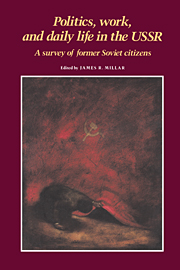Book contents
- Frontmatter
- Contents
- Foreword
- List of contributors
- PART I INTRODUCTION
- PART II POLITICS: SOURCES OF REGIME SUPPORT
- PART III WORK: ECONOMIC/DEMOGRAPHIC TRENDS
- 6 Inequality of earnings, household income, and wealth in the Soviet Union in the 1970s
- 7 The life course of Soviet women born 1905–1960
- 8 Productivity, slack, and time theft in the Soviet economy
- PART IV LIFE: SOCIAL STATUS, ETHNIC RELATIONS, AND MOBILIZED PARTICIPATION
- Appendix A The SIP General Survey sample
- Appendix B Response effects in SIP's General Survey of Soviet emigrants
- Glossary
- General bibliography of Soviet Interview Project publications
- Index
8 - Productivity, slack, and time theft in the Soviet economy
Published online by Cambridge University Press: 21 March 2010
- Frontmatter
- Contents
- Foreword
- List of contributors
- PART I INTRODUCTION
- PART II POLITICS: SOURCES OF REGIME SUPPORT
- PART III WORK: ECONOMIC/DEMOGRAPHIC TRENDS
- 6 Inequality of earnings, household income, and wealth in the Soviet Union in the 1970s
- 7 The life course of Soviet women born 1905–1960
- 8 Productivity, slack, and time theft in the Soviet economy
- PART IV LIFE: SOCIAL STATUS, ETHNIC RELATIONS, AND MOBILIZED PARTICIPATION
- Appendix A The SIP General Survey sample
- Appendix B Response effects in SIP's General Survey of Soviet emigrants
- Glossary
- General bibliography of Soviet Interview Project publications
- Index
Summary
Introduction
This study uses eyewitness accounts of former Soviet workers and employees as an unconventional source of information on Soviet enterprise operations. The Soviet Interview Project (SIP) collected information in 1983 and 1984 from approximately 2,900 former Soviet citizens who reported on the jobs they held at the end of their last “normal” period (LNP) of life in the Soviet Union. For the vast majority of respondents, the end of this last normal period was 1978 or 1979. Soviet Interview Project respondents were asked a number of factual and perception questions concerning the Soviet workplace. They were asked for their assessment of productivity (whether it was rising or falling and the reasons why), their perception of the amount of labor slack and the seriousness of supply shortages, and their views on specific enterprise problems such as alcoholism, absenteeism, information flows, and worker apathy. They also responded to questions on dismissals and career advancement within the firm. Respondents were asked a wide range of factual questions concerning their primary job, second job, private economic activity, and time spent on personal business during work hours.
This chapter focuses attention on several issues. The first is how Soviet workers, as eyewitnesses at the firm level, assessed Soviet enterprise operations in the late 1970s. How do Soviet workers evaluate labor productivity, labor redundancy, alcoholism, apathy, and supply disruptions in their enterprises? The second issue is: What types of Soviet enterprises are systematically described as poor performers?
- Type
- Chapter
- Information
- Politics, Work, and Daily Life in the USSRA Survey of Former Soviet Citizens, pp. 241 - 276Publisher: Cambridge University PressPrint publication year: 1987
- 9
- Cited by



